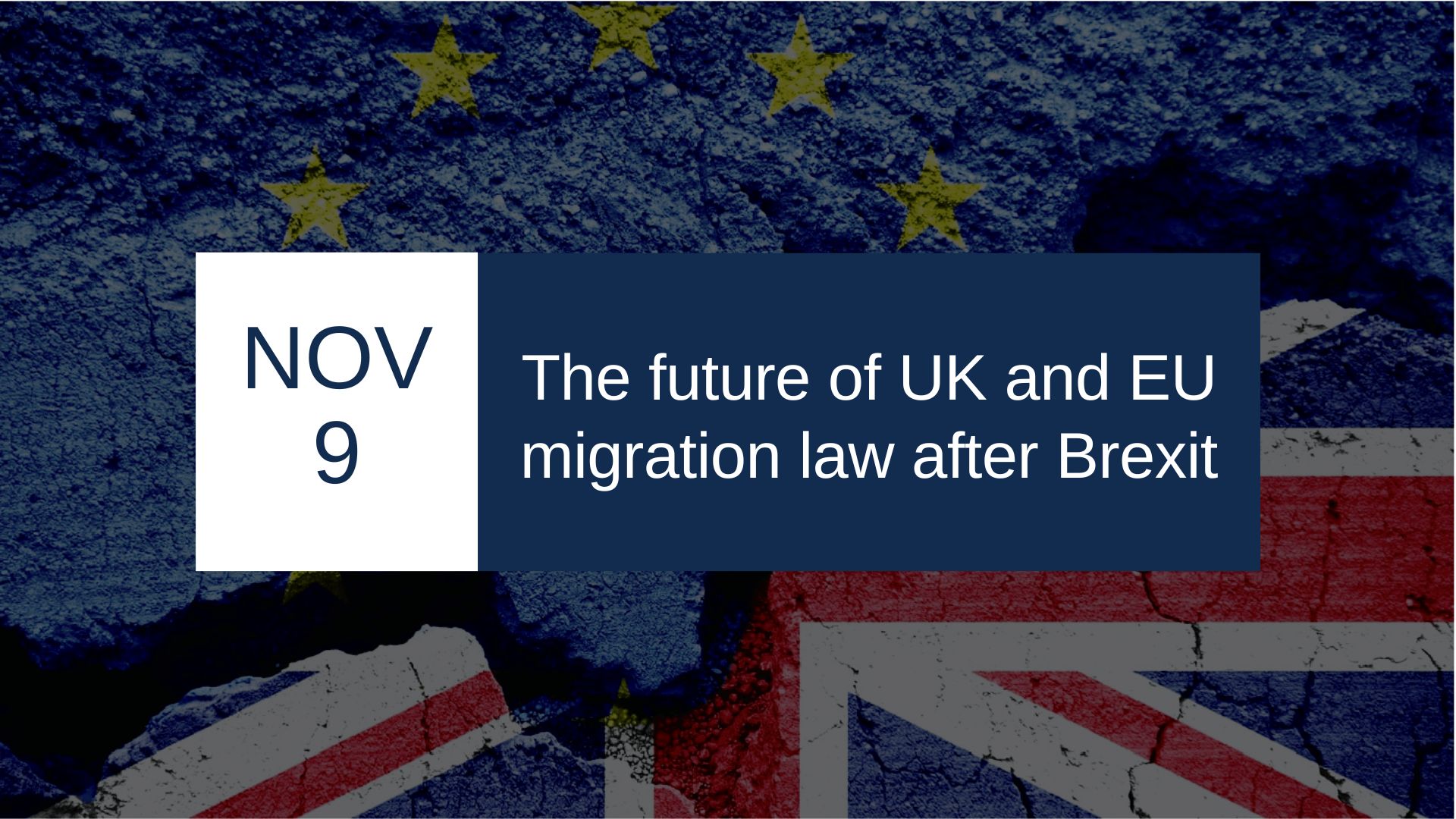Havva Yesil (Dublin City University)
On Thursday 9th November 2023, the DCU Brexit Institute hosted an online event on “The future of UK and EU migration law after Brexit”. The event took place from 4pm to 5.30pm (IST). In light of ongoing migration reform within the European Union, the appeal made by the UK government regarding the UK-Rwanda relocation agreement in the Supreme Court, and the increasing trend of offshoring asylum applications, the purpose of this event was to convene experts in order to engage in a comprehensive discussion and analysis of the most recent developments in the field of migration. It was opened by the welcoming and introductory remarks of Niall Moran, Deputy Director of the Brexit Institute. It was followed by the keynote speech by Sir Simon Hughes, Former UK Minister of Justice under the chairing of David Davin-Power, former RTÉ Political Correspondent. Then, the panel started with the participation of Matilde Ventrella (Senior Lecturer in Law, Liverpool John Moores University), Hilkka Becker (Chairperson of the International Protection Appeals Tribunal) and Janine Silga (Assistant Professor in European Union Law, DCU).
Simon Hughes provided an overview of the historical context behind the Rwanda agreement and related legal issues within the United Kingdom, clarifying the complicated details of the Brexit process and the immigration policies implemented by recent UK governments. He made reference to the impact of migration policies implemented by successive UK governments, namely those led by Theresa May, Boris Johnson, and Rishi Sunak. He engaged in his presentation regarding the dynamic shifts observed in migratory patterns, encompassing several factors such as the global pandemic of Covid-19, the phenomenon of climate change, the ongoing crisis in Afghanistan, the conflict between Russia and Ukraine, as well as the ongoing conflicts in the Middle East. He discussed the Illegal Migration Act which requires that those who arrive in the UK illegally will not be able to stay there and will instead be detained and then promptly removed, either to their home country or a safe third country. He then proceeded to explain the Rwanda agreement, which entails a programme wherein certain individuals with asylum applications that have been judged inadmissible by the United Kingdom would be transported to Rwanda for the purpose of having their asylum claims assessed. He highlighted that the Rwanda agreement raises concerns regarding violations of international human rights legislation. Furthermore, he provided a concise overview of the application made to Strasbourg and the subsequent interim order. Finally, he examined the ruling handed down by the Supreme Court, as well as the potential ramifications it may have on the migration system in the United Kingdom.
Following the keynote speech, Matilde Ventrella conducted an evaluation of the Rwanda agreement, focusing on the scope of the agreement and the legal foundation of international refugee law, while also addressing the issue of human rights breaches. She engaged in an argument regarding the court of appeal pertaining to the deal. Her attention was directed towards the principle of non-refoulement and the acceptance of safe third countries, while also acknowledging the potential risks faced by refugees in terms of refoulement and the shortcomings of the asylum system in Rwanda, in relation to the notion of safe third countries. Furthermore, the speaker highlighted potential future issues that may arise in the UK if they decide to abandon the ECHR, particularly with regards to ensuring the fulfilment of obligations pertaining to the protection of refugees.
Hilkka Becker‘s presentation primarily examined the implications or prospective implications of the migration pact in Ireland, as well as the influence of Brexit in the context of the Rwanda agreement and prevailing legislation within Ireland. She also discussed the topic of refugee and migration management, which entails a form of responsibility sharing commonly known as burden sharing among member states. She specifically highlighted Ireland’s participation in this duty. The speaker provided an explanation of the border protocols and the procedures pertaining to the arrival of refugees. The emphasis was placed on the notion that within the EU, there should be a harmonisation of outcomes, such that individuals originating from the same countries can anticipate similar outcomes regardless of the specific EU member state in which they apply. The speaker underlined the difficulties that would arise for Ireland in choosing to participate in any agreement, particularly in terms of resource allocation and the highly delicate political matter of managing border interactions with Northern Ireland.
In her presentation, Janine Silga addressed the external dimensions of the EU’s asylum policy and the growing trend towards extraterritoriality. She engaged in a discussion regarding the Rwanda agreement within the context of the European Union’s strategy to relocate the processing of asylum claims beyond its borders, as well as other such arrangements such as the EU-Turkey statement. Furthermore, she assesses the agreement by drawing a comparison to the Danish strategy, highlighting that this undertaking signifies an important shift from conventional notions of territorial asylum. The speaker also discussed the responses of member states to the concept of a safe third country. They highlighted that the allocation of EU external funding towards migration management goals has resulted in a type of conditionality, wherein development aid from the EU is contingent upon the willingness of recipient countries to support EU migration management, specifically in terms of readmission.
The views expressed in this blog reflect the position of the author and not necessarily that of the Brexit Institute Blog.



